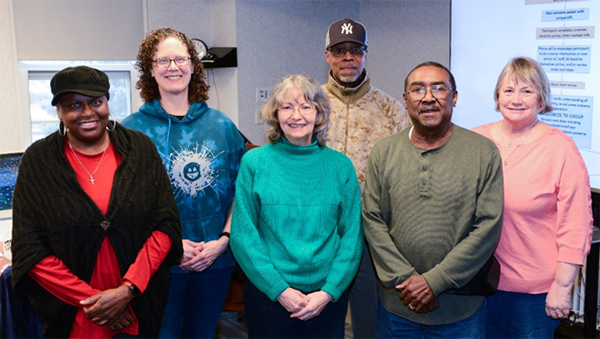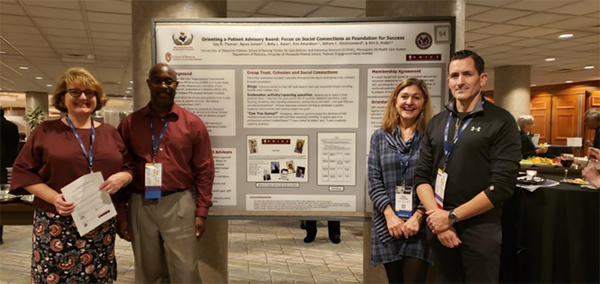 |
Engaging the Veterans' Point of ViewHSR&D’s monthly publication Veterans’ Perspectives highlights research conducted by HSR&D and/or QUERI investigators, showcasing the importance of research for Veterans – and the importance of Veterans for research. In the September 2019 Issue:
|
IntroductionCenter for Care Delivery and Outcomes ResearchDirected by Steven Fu, MD, MSCE, the Center for Care Delivery and Outcomes Research (CCDOR) works to develop and evaluate interventions and implementation strategies that improve healthcare delivery, Veteran engagement in healthcare, and Veterans’ health and functioning in their communities. This mission is being accomplished by elevating the quality, consistency, and equity of healthcare and outcomes for all Veterans through innovative health services and implementation research.HSR&D's Center for Care Delivery and Outcomes Research (CCDOR) has been working for the last several years to enhance dialogue between their researchers and their community. CCDOR has created two local groups of staff and investigators: The Veterans Engagement Workgroup (ViEW) and the CCDOR Communications Committee (Triple C). The shared mission of these groups is to foster communication and make their research more relevant to Veterans – and the general public. Triple C disseminates critical information about CCDOR research to VA and non-VA stakeholders. ViEW uses several models to bridge the researcher-community chasm during both the conception and conduct of individual projects. Current models include Veteran panels that have adapted Vanderbilt’s Community Engagement Studio model (Joosten et al., 2015), and study-specific panels for two ongoing large clinical trials (LAMP and VOICE, see below for more information). Community Engagement StudiosCommunity Engagement Studios are meetings between researchers and community members who may benefit from the research. Studios are structured to emphasize a “co-learning” experience and promote an effective two-way dialogue. The model focuses on community members with ‘lived experience’ relevant to a project and effective facilitation intended to maximize community members’ comfort with sharing experiences and opinions. ViEW has completed five studios for two different research projects. HSR&D investigators collaborated with external experts in community engagement: Dr. Mickey Eder (University of Minnesota’s Clinical and Translational Science Institute) and Gay Thomas and Betty Kaiser (Wisconsin Network for Research Support). The studios were conducted with Veterans who represented the researcher’s end-users and two neutral, trained facilitators, including a Veteran from CCDOR’s staff. Veteran studio members provided feedback on 1) materials for a telephone-based, qualitative study of Veterans with PTSD, and 2) materials for a study of at-home colon cancer screenings. Some reflections from the colonoscopy studio included: “One in 20 women get colon cancer!? Ugh. This really speaks to me.” —Veteran participant “If the FIT test is better than the colonoscopy, then I’d rather do that one. By better, I mean I’d rather do the stool test than the colonoscopy procedure. I’ve been putting off the colonoscopy for years.” —Veteran participant Members of the PTSD studio also offered specific, valuable feedback on recruitment materials and interview structure: “…if I were homeless, which I have been in the past, a 90-minute phone interview would simply not work for me. There are some places that I do not have access to a phone.” —Veteran participant “I have suffered from MST [military sexual trauma]…. Knowing the sex of the interviewer may help participants feel more comfortable.” —Veteran participant “Thank YOU for hosting us. It was great to be a part of such a group – and was actually a very humbling experience for me listening to the stories that were shared. I just hope it helps in accomplishing what the research team is trying to accomplish. You'll need to keep me posted to see how this research study turns out.” —PTSD studio participant Currently, ViEW is recruiting Veterans to establish three standing groups who will meet regularly to provide investigators with feedback on their research: 1) Veterans with a broad range of experiences who receive VA care, 2) Veterans who have experienced PTSD, and 3) women Veterans who have experienced sexual assault. The first meetings for these Veteran groups will take place this Fall. Learning to Apply Mindfulness to Pain
For example, in one video the mindfulness instructor used a classic example from Mindfulness-Based Stress Reduction of a person hitting his thumb with the hammer. The VEP found this example off-putting, as it felt like comparing a thumb injury to their chronic pain. In another example, the fact that mindfulness practice could be done while moving (e.g., walking) had not been clear to all participants. Members appreciated that mindfulness practice could be “an active thing” and discussed the importance of emphasizing that point. The feedback led researchers to rewrite the curriculum to emphasize mindfulness in everyday life and mindful movement. 
Veteran Engagement Panel for LAMP - From left to right: Rosie Glenn, Terri Stam, Neddy Wuertz, Ronald Nelson, Lawrence Clardy, and Donna Swenson. Formative evaluations of LAMP VEP meetings showed that all participants agreed or strongly agreed that they were satisfied with the meetings and felt comfortable sharing: “This was awesome. Everyone seemed to respect what others had to say.” —Veteran participant “This was a great experience! Thank you. I look forward to continue being a part of this group.” —Veteran participant Veterans' Pain Care Organizational Improvement Comparative Effectiveness
“Having a collective conversation with people from across the country, with different demographics and with their own experiences with pain management has definitely opened my eyes and given me a different perspective.” —VEP member Joshua Oakley, Army Veteran and patient at the San Francisco VA Medical Center. Since that inaugural meeting, the VEP has met regularly by teleconference and has contributed extensively to the VOICE study. Examples of VEP contributions include revising recruitment materials, writing a “welcome from the VEP” letter for new study participants, and providing advice on how to improve outcome completion rates. Dr. Erin Krebs, a VA primary care physician and the VOICE lead researcher, said she has especially appreciated VEP contributions to development of patient-facing study materials, even when their critiques have sent her back to the drawing board. “I’d rather get an early course correction than find out down the road that our approach was ineffective.” —Dr. Erin Krebs, lead researcher, VOICE study. One particularly valuable product of the VEP collaboration is a patient-centered, user-friendly pamphlet about buprenorphine-naloxone (medication being tested in the VOICE study). [This pamphlet is available on the Minneapolis VA SharePoint site (here) and the SCOUTT SharePoint site (here).] VEP members suggested key components—including a patient testimonial, decision checklist, and overview of opioid withdrawal symptoms—and helped create the final product through an iterative process with study clinicians. The VOICE study pamphlet was so well received that the team created a non-research version. This version has been disseminated through the Facilitation of the Stepped-Care Model and Medication Treatment for Opioid Use Disorder QUERI Partnered Evaluation Initiative and the VA Academic Detailing program. 
VEP co-presenting at the 2018 PCORI Annual Meeting in Washington, DC. Left to right: Agnes Jensen (CCDOR; US Navy Veteran), William Westmoreland (VEP; US Army Veteran), Gay Thomas (Wisconsin Network for Research Support), and Elijah Sacra (VEP; US Marine Corps Veteran). Veterans and Researchers Voice their Respective PerspectivesCheryl Brown, US Navy Veteran and patient at the VAMC in Dallas, TX, describes her experience with the VEP, as “A great experience to give back to the Veteran community by contributing, at the ground level, to research that could significantly impact how pain is managed with the patient a partner in his care. I have felt quite valued, along with the other members of the [VEP], providing our ongoing feedback at all levels of the VOICE VA Study. To think, someone is actually interested in what I [we], the Veteran patient[s] have to say.” VOICE researcher, Dr. Erin Krebs, described her experience with the VEP as “incredibly enlightening and rewarding.” After working with the VOICE VEP, she said, “I can’t imagine doing a major research project without patient involvement.”
The VOICE study is funded through the Patient-Centered Outcomes Research Institute® (PCORI), and the LAMP study is funded by the Department of Defense as part of the NIH-DoD-VA Pain Management Collaboratory. |